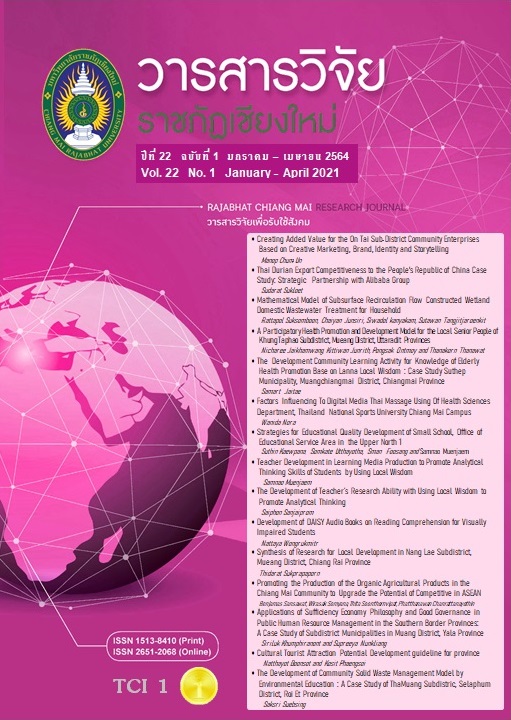การพัฒนาความสามารถด้านการวิจัยของครูที่ใช้ภูมิปัญญาท้องถิ่นเพื่อส่งเสริมทักษะการคิดวิเคราะห์
DOI:
https://doi.org/10.14456/rcmrj.2021.241451คำสำคัญ:
การพัฒนาความสามารถด้านการวิจัย, ภูมิปัญญาท้องถิ่น, ทักษะการคิดวิเคราะห์บทคัดย่อ
การวิจัยนี้มีวัตถุประสงค์ 1) เพื่อศึกษาสภาพปัจจุบันของการจัดการเรียนรู้ ความต้องการของครูในการพัฒนาการจัดการเรียนรู้และการวิจัยโดยใช้ภูมิปัญญาท้องถิ่นเพื่อส่งเสริมทักษะการคิดวิเคราะห์ของนักเรียน 2) เพื่อออกแบบกระบวนการพัฒนาความสามารถด้านการวิจัยของครูที่ใช้ภูมิปัญญาท้องถิ่นเพื่อส่งเสริมทักษะการคิดวิเคราะห์ และ 3) เพื่อศึกษาผลการพัฒนาความสามารถด้านการวิจัยของครูที่ใช้ภูมิปัญญาท้องถิ่นเพื่อส่งเสริมทักษะการคิดวิเคราะห์ พื้นที่เป้าหมายคือ โรงเรียนชลประทานผาแตก อำเภอดอยสะเก็ด จังหวัดเชียงใหม่ ประชากร ได้แก่ ครู 24 คน และนักเรียนจำนวน 406 คน ดำเนินงาน 3 ขั้นตอน คือ การวางแผน การดำเนินการพัฒนาครู และการติดตามประเมินผลการพัฒนาครู เครื่องมือที่ใช้ ได้แก่ แบบบันทึกการวิเคราะห์สถานการณ์ แบบทดสอบความรู้ความเข้าใจเกี่ยวกับการวิจัยของครู แบบประเมินคุณภาพงานวิจัย แบบทดสอบทักษะการคิดวิเคราะห์ของผู้เรียน และแบบสอบถามความคิดเห็นของครูที่มีต่อการพัฒนา วิเคราะห์ข้อมูลโดย ค่าเฉลี่ย ส่วนเบี่ยงเบนมาตรฐาน ร้อยละ และการวิเคราะห์เนื้อหา ผลการวิจัยพบว่า 1) สภาพปัจจุบันของการจัดการเรียนรู้ของครูยังขาดการส่งเสริมการคิดวิเคราะห์ ครูมีความต้องการในการพัฒนาขวัญและกำลังใจ กระบวนการวิจัย การจัดการเรียนรู้ที่ส่งเสริมทักษะการคิดวิเคราะห์ การวัดและประเมินผลที่ส่งเสริมทักษะการคิดวิเคราะห์ และการเขียนรายงานการวิจัย 2) กระบวนการพัฒนาครูที่ออกแบบโดยการมีส่วนร่วม ประกอบด้วยการประชุมเชิงปฏิบัติการ การอบรมเชิงปฏิบัติการ การปฏิบัติการจริงในภาคสนาม และการนิเทศ กำกับติดตามจากผู้บริหาร และ 3) ผลการพัฒนาครู พบว่า คะแนนความรู้ความเข้าใจเกี่ยวกับการวิจัยของครูหลังเข้าร่วมการพัฒนามีค่าสูงกว่าก่อนการพัฒนา ค่าเฉลี่ยร้อยละของคะแนนการประเมินคุณภาพงานวิจัยของครูมีค่าสูงกว่าเกณฑ์ร้อยละ 70 คะแนนทักษะการคิดวิเคราะห์ของนักเรียนหลังการจัดการเรียนรู้มีค่าสูงกว่าก่อนเรียนในทุกระดับชั้น ครูมีความคิดเห็นในเชิงบวกต่อกระบวนการพัฒนา
Downloads
เอกสารอ้างอิง
Art-In, S. (2011). The Development of a Learning Management Model Emphasizing Analytical Thinking in the Science Learning Area. KKU Research Journal, 16(1), 72-78. (In Thai)
Avorn, S., & Nam-Naphon, K. (2014). Teacher Development in Learning Management in Critical Thinking. Pha Namthip Wittaya School Secondary Educational Service Area Office 27. Journal of the Graduate School of Pichayatorn, 9(2), 71-80. (In Thai)
Boonphadung, S. (2014). The Development of Teachers’ Research Competency based on Vygotsky’s Zone of Proximal Development (ZPD) and Partnership. Journal of Education Naresuan University, 16(4), 22-33. (In Thai)
Boripis, T. (2009). Supervision and evaluation. Bangkok: Thonburi Rajabhat University. (In Thai)
Chaiphan, S. (2010). Teacher and Research Practice: Classroom Research. Journal of Narathiwas Rajanagarindra University, 2(3), 99-114. (In Thai)
Chotvichai, Y. (2014). The Development of Learning Package in Local Wisdoms for Subject for Analytical Thinking Development of Chandrakasem Rajabhat University Students. Chandrakasem Rajabhat University Journal, 20(38), 51-58. (In Thai)
Jaichakad, W. (2017). Teacher Development Strategy for Teaching Analytical Thinking in Secondary Schools under the Secondary Educational Service Area Office 8. (Master of Education Thesis, Chulalongkorn University). (In Thai)
Khaemmanee, T. (2009). The Science of Teaching Knowledge to Organize an Effective Learning Process. (10th ed.). Bangkok: Chulalongkorn University Press. (In Thai)
Khamparat, J. (2006). Teaching Arts for the Development of Elementary Creativity. Bangkok: 2020 World Media. (In Thai)
Kowtrakul, S. (2007). Educational Psychology. (7th ed.). Bangkok: Chulalongkorn University Press. (In Thai)
Ministry of Education. (2008). Basic Education Core Curriculum, B.E. 2551. Bangkok: Printing house for delivery of goods and packages. (In Thai)
Office of the Basic Education Commission. (2012). Guidelines for Organizing the Learning Process According to the Focus on the Development of Learner Quality Thinking Skills. Learning Process Development Group Office of Academic and Educational Standards. (In Thai)
Office of Nation Education Standards and Quality Assessment (ONESQA) [Public Organisation]. (2007). Summary Synthesis of Quality Assessment Results outside the Basic Education Institutions (First round 2001-2005). Retrieved from http://www.onesqa.or.th/th/home/index.php (In Thai)
Office of Standards and Quality Assessment (ONESQA) [Public Organization]. (2018). Indicators and Evaluation Criteria for the 4th Round (2016-2020). Retrieved from https://sites.google.com/a/srinan.ac.th/internal-quality-assurance/taw-bng-chi-laea-kenth-kar-pramein-sms-rxb4-2559-2563 (In Thai)
Panich, W. (2017). Way to create learning for students in the 21st century. Bangkok: Sodsri-Saritwong Foundation. (In Thai)
Sompamitr, T. (2015). The Implementation of Local Play-Oriented Learning Modules Designed For Mattayomsueksa 2 Ethnical Students’ Scientific Skill Improvements. Graduate School Journal Chiang Rai Rajabhat University, 8(18), 67-74. (In Thai)
Varakamin, D., Rukumnuaykit, P., & Saifah, Y. (2016). A study of Critical Thinking and Public Mental Abilities to Develop the Potential of Being a Good and Talented Thai Student. Retrieved from https://www.knowledgefarm.in.th/critical-thinking-and-civic-mindedness-on-thai-student/
ดาวน์โหลด
เผยแพร่แล้ว
รูปแบบการอ้างอิง
ฉบับ
ประเภทบทความ
สัญญาอนุญาต
1. บทความ ข้อมูล เนื้อหา รูปภาพ ฯลฯ ที่ได้รับการตีพิมพ์ใน “Community and Social Development Journal” ถือเป็นลิขสิทธิ์ของ Community and Social Development Journal มหาวิทยาลัยราชภัฏเชียงใหม่ และเพื่อให้เผยแพร่บทความได้อย่างเหมาะสมผ่านสื่อสิ่งพิมพ์และอิเล็กทรอนิกส์ ผู้เขียนยังคงถือครองลิขสิทธิ์บทความที่ตีพิมพ์ภายใต้ใบอนุญาต Creative Commons Attribution (CC BY) ซึ่งอนุญาตให้เผยแพร่บทความซ้ำในแหล่งอื่นได้ โดยอ้างอิงต้องอ้งอิงบทความในวารสาร ผู้เขียนต้องรับผิดชอบในการขออนุญาตผลิตซ้ำเนื้อหาที่มีลิขสิทธิ์จากแหล่งอื่น
2. เนื้อหาบทความที่ปรากฏในวารสารเป็นความรับผิดชอบของผู้เขียนบทความโดยตรง ซึ่งกองบรรณาธิการวารสารไม่จำเป็นต้องเห็นด้วยหรือร่วมรับผิดชอบใดๆ














